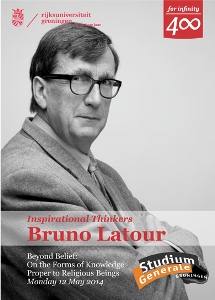What is the difference between knowing and believing?
From 11 to 15 May, the University of Groningen will host a unique international conference on religion and knowledge systems: ‘Religion and Pluralities of Knowledge’. During the conference, over 400 scholars from all over the world will attend sessions, listen to keynote speakers and, above all, discuss with each other the dilemmas in which religion and knowledge can play a major role.
Freedom of speech and freedom of religion can often clash hard. Which visions and traditions, or knowledge claims, shape our society? Our ideas about religion have changed, as illustrated by the fact that ‘-isms’ are currently the rage in the Netherlands. The tools that we use to ponder religion and knowledge thus need to be adapted. The wider world has become smaller and the amount of knowledge, and the ideas on which it is based, have resulted in new world images.
Kocku von Stuckrad
The conference is organized annually by the European Association for the Study of Religions in cooperation with the academic society of the host country. This year the IAHR, the International Association for the History of Religions, has joined the conference. ‘Very unusual’, says Kocku von Stuckrad, ‘and a great honour’. As chair of the NGG, the Dutch association for the academic study of religion, and Dean of the Faculty of Theology and Religious Studies of the University of Groningen, von Stuckrad is the driving force behind the organization of the conference. ‘The International Association is very interested in the knowledge claims theme, and has every confidence in our organization.’
The NGG has spent over three years on the preparations and on developing a strong programme. Given the international interest and the speed with which participants registered, this has clearly borne fruit. The PhD students who have registered by means of proposals are in their own PhD groups, and thus have their own forum for young researchers.

Beyond Belief: lecture by Bruno Latour
One of the four keynote speakers, philosopher and anthropologist Bruno Latour, will give a public lecture on the difference between knowing and believing on Monday 12 May in the Nieuwe Kerk in cooperation with Studium Generale. Latour will examine the complex relationship between believers and their gods, and discuss the underlying knowledge claims. Is it not high time we abandoned the strict division between ‘knowing’ and ‘believing’?
Only one of the keynote speakers, Jörg Rüpke, is a religious studies specialist. Birgit Meyer is an anthropologist and the Italian Carl Ginzburg is a historian. They will each take their own field as the starting point to investigate the position of religion in Europe and the perception of religion worldwide. The interdisciplinary character of Religious Studies means that religion provides the ideal angle of approach to chart issues based on knowledge claims. Von Stuckrad gives an example: Does putting Bible verses on your roof mean that you are taking a proper religious approach or are you actually busy offending people, or can we even go as far as considering it landscape pollution?
400th Anniversary celebrations
The conference will be immediately followed by the festivities organized by the University of Groningen in honour of its 400th anniversary. It is no coincidence that the conference is being organized in this festive year – the Faculty of Theology and Religious Studies also turns 400 this year. The history of both institutes is closely interwoven. The multidisciplinary nature of religious studies dovetails with the aims of the University, and has done so for 400 years: ‘Working at the frontiers of knowledge’.
More news
-
06 January 2026
Connecting with history
